8.3/10
Everything fans have wanted from a Deadpool film
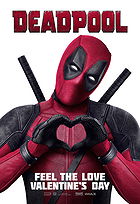 Posted : 9 years ago on 6 June 2016 09:02
(A review of Deadpool)
Posted : 9 years ago on 6 June 2016 09:02
(A review of Deadpool) 0 comments, Reply to this entry
0 comments, Reply to this entry
Entertaining follow-up
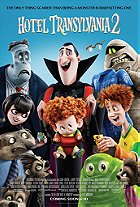 Posted : 9 years, 2 months ago on 27 March 2016 08:28
(A review of Hotel Transylvania 2)
Posted : 9 years, 2 months ago on 27 March 2016 08:28
(A review of Hotel Transylvania 2)Despite Adam Sandler's shonky track record, Hotel Transylvania developed into an unexpected hit all the way back in 2012 and was a highly enjoyable animated endeavour to boot. A child-friendly adventure with enough entertainment to offer the adult demographic, the movie took many classic Universal horror characters - including Count Dracula, Frankenstein's Monster, the Wolfman, the Mummy, etc. - and turned them into homogenised protagonists, generating a rich comedic world ripe to further exploit in any sequels. Luckily, 2015's Hotel Transylvania 2 retains many of the qualities that made its predecessor such a treat, and it's once again overseen by veteran animation director Genndy Tartakovsky. Even though storytelling is scattershot, it's an entertaining follow-up that will almost certainly please children, especially if the first Hotel Transylvania was to their liking.
Soon after the events of the original film, human Jonathan (Andy Samberg) and vampire Mavis (Selena Gomez) get married, and the new bride finds herself pregnant, much to the excitement of her father, Dracula (Adam Sandler). However, the boy, Dennis (Asher Blinkoff), seems to favour his human side, much to the dismay of Dracula, who wants his grandson to follow in his footsteps and become a true bloodsucker. In addition, Dracula is further disheartened by the prospect of Jonathan and Mavis moving to California to raise Dennis as a regular human tyke. Approaching Dennis' fifth birthday, Dracula persuades Jonathan to take Mavis on a trip to visit his parents (Megan Mullally and Nick Offerman), under the guise of giving the couple a break from the rigours of parenthood. Meanwhile, Dracula secretly enlists the help of his monster pals - Frankenstein’s Monster (Kevin James), werewolf Wayne (Steve Buscemi), invisible man Griffin (David Spade), mummy Murray (Keegan-Michael Key), and Blobby (Jonny Solomon) - to hopefully awaken Dennis' vampire gene and show the boy the ways of monster life.
Written by Sandler and Robert Smigel, Hotel Transylvania 2 is quick to introduce Dennis in the first act before rushing through the tyke's first few years to reach his fifth birthday. Since the first flick was so small-scale and confined, this sequel is keen to leave the titular resort, briskly setting up the plot to allow for monkey (monster?) business outside the hotel's walls. However, the script doesn't quite know when to quit in terms of plot, leading to the third-act development involving the introduction of Dracula's father, Vlad (the legendary Mel Brooks), who probably should have been saved for another sequel. Still, Hotel Transylvania 2 remains joyous through to the finish line, and though it's not as poignant or as thoughtful as a typical Pixar feature, it does have a few things on its mind about the dangers of narrow-minded prejudice, and the importance of tolerance and acceptance. This is still a fluffy comedy by and large, but such subtext does provide a worthwhile lesson for the children in the audience.
Sumptuously animated by the folks at Sony, Hotel Transylvania 2 has an ace up its sleeve in director Tartakovsky, who also worked on television shows like The Powerpuff Girls and Star Wars: Clone Wars. Tartakovsky has a nice eye and ear for comedy, gifting the production with plenty of amusing slapstick and sharp one-liners, preserving a light-hearted, goofy spirit that keeps the proceedings entertaining even when the storytelling is at its rockiest. With two parallel storylines (one concerning Mavis and Jonathan in California, and another about Dracula and Dennis), the film stays fresh, allowing for a wider scope and more opportunities for amusing situations and hilarious jokes. Plus, the actors all commit to the material wonderfully, with Sandler again showing that he's probably better suited for animation than live-action at this point in his career. Further colour is provided by Brooks, who relishes the chance to voice a goofy vampire, while the likes of Samberg, James, Buscemi and Spade all hit their marks. Also notable are real-life married couple Offerman and Mullally as Jonathan's parents - their trademark personalities are a perfect fit for their respective characters.
Disappointingly, Hotel Transylvania 2 is loaded with product placement; the characters all use smartphones with a very prominent Sony logo, for instance, and there's even some erroneous pop music that comes across as forced. Nevertheless, this is a fun, goofy, simplistic cartoon that goes down easily enough, and it compensates for its narrative shortcomings and other flaws by providing a steady stream of side-splitting gags. And considering the dirge that Sandler has headlined lately, the fact that it's actually funny is a huge deal.
6.8/10
 0 comments, Reply to this entry
0 comments, Reply to this entry
A tad uninspired on the whole
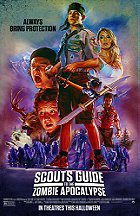 Posted : 9 years, 2 months ago on 25 March 2016 01:31
(A review of Scouts Guide to the Zombie Apocalypse)
Posted : 9 years, 2 months ago on 25 March 2016 01:31
(A review of Scouts Guide to the Zombie Apocalypse)A curious amalgam of Zombieland, The Goonies and any number of John Hughes films, Scouts Guide to the Zombie Apocalypse is an amusingly-titled production full of potential, continuing the current media fascination with the undead. Following in the shadow of flicks like Cockneys vs. Zombies and Navy SEALs vs. Zombies, this particular endeavour pits socially awkward teens against hordes of flesh-eaters. However, in the hands of director Christopher Landon (last seen at the helm of 2014's abominable Paranormal Activity: The Marked Ones), Scouts Guide is not as hilarious or as taut as one might expect, only coming alive during isolated moments. It's a technically proficient horror-comedy, but it is a bit uninspired on the whole, lacking the spark of wittiness that has elevated similar productions.
At a lab in suburban California, a resting zombie is disturbed by a careless janitor, leading to a plague outbreak that rapidly spreads across the town. Meanwhile, high school scout members Ben (Tye Sheridan) and Carter (Logan Miller) are preparing to attend a camp-out celebration with well-meaning pal Augie (Joey Morgan), which they intend to be their swan song as scouts. Invited to a secret senior party, Ben and Carter ditch Augie for the night, but soon find that the town has been overrun by bloodthirsty zombies. Teaming up with resourceful strip-club waitress Denise (Sarah Dumont), the two adolescent scouts brave the doomsday scenario as they attempt to find their way to the party, while Augie has his own experiences with the undead horde.
To the credit of screenwriters Carrie Lee Wilson and Emi Mochizuki (with input from Landon), Scouts Guide makes a genuine attempt to develop the core trio of teens in the first act to ensure that we have a reason to care about them when they're exposed to mortal danger. In spite of the inherent clichés, there is fun to be had and the characterisations are effective enough. However, there are a few too many ill-advised deviations into serious territory, including Augie's disappointment that Ben and Carter choose to not only ditch him, but leave scouts. It's an attempt to add a degree of heart to the proceedings, but it comes off as perfunctory rather than an organic constituent of the narrative. And while there are some funny moments here, Scouts Guide comes up short in terms of belly-laughs, which doesn't do the pacing any favours. The movie may be bite-sized at under an hour-and-a-half, but it's undeniably spotty.
Nevertheless, Scouts Guide to the Zombie Apocalypse does hit its mark from time to time, with vignettes that revel in the type of silliness we would expect to see from a movie of this ilk. One of the more humorous plot digressions involves the boys' beloved Scout Leader Rogers (David Koechner), who shows up at various times throughout the night, while a zombie Britney Spears fan sings along to "Hit Me Baby One More Time," and there's a chase set to Dolly Parton's "9 to 5" in a fan's merchandise-laden home. Landon embraces the irreverent tone - there's one moment involving a zombie penis that amuses, and we get to see Cloris Leachman as a zombie who can't bite into anybody after losing her false teeth. It's all executed with style, benefitting from impressive zombie make-up and gore effects, and Scouts Guide also introduces its own recognisable brand of zombies. Acting across the board is respectable, particularly Sheridan, who grounds the movie by playing the material straight.
Scouts Guide to the Zombie Apocalypse has its moments and is enjoyable on the whole, but the problem is that it was produced in the shadow of funnier, scarier and wittier zombie comedies like Shaun of the Dead and Zombieland, who represent the gold standard for this subgenre. Furthermore, it's not as incisive or cutting edge as Cabin in the Woods. Still, the movie is not a total misfire, thanks to its competent direction and a number of energetic action scenes. The climax is particularly fun, with the troupe battling hundreds of zombies using whatever makeshift weapons they can find. Scouts Guide is easy viewing and it's not a waste of time, but it could have been superior in more assured hands.
6.1/10
 0 comments, Reply to this entry
0 comments, Reply to this entry
Competent but imperfect gangster thriller
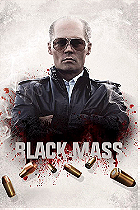 Posted : 9 years, 2 months ago on 14 March 2016 05:59
(A review of Black Mass)
Posted : 9 years, 2 months ago on 14 March 2016 05:59
(A review of Black Mass)More than anything else, Black Mass is an actor's showcase; a golden opportunity for actors to show off their talents by embodying historical characters. It's the latest cinematic endeavour for director Scott Cooper, whose previous movies (Crazy Heart, Out of the Furnace) are also more notable for their acting than storytelling. Black Mass is bolstered by magnificent performances and a solid technical presentation, yet its two-hour running time merely amounts to a number of effective set-pieces, with Cooper unable to bring it all together in an overly substantive fashion. Still, it's difficult to entirely write off this competent gangster thriller, which certainly has its strong points.
In the 1970s, ruthless criminal James "Whitey" Bulger (Johnny Depp) is poised to take over an Irish mob crew known as the Winter Hill Gang in his homeland of South Boston, standing in stark contrast to his brother Billy (Benedict Cumberbatch), a U.S. senator. On the other side of the law is Bulger's childhood pal John Connolly (Joel Edgerton), an FBI agent torn between his friendship with the volatile mobster and his professional responsibilities. To gain immunity from criminal activities, Bulger agrees to work as an FBI informant, which he uses to his advantage, gaining unprecedented power as he feeds the Feds minimal information while Connolly protects his interests from within the bureau. But Bulger’s misdeeds continue to pile up, and Connolly's superiors at the FBI begin to dig deeper.
Written by Mark Mallouk and Jez Butterworth, the movie is predominantly based on Dick Lehr and Gerard O'Neill's 2001 novel "Black Mass: The True Story of an Unholy Alliance Between the FBI and the Irish Mob," staying true enough to the real-life events while taking a certain degree of dramatic license when it comes to certain characters. Parts of the film are framed through the eyes of Jimmy's associates - including Kevin Weeks (Jesse Plemons) - who talk to the FBI about their involvement in the gang and knowledge of Bulger's countless crimes. It's an interesting way to justify the narrative, which does boil down to a "greatest hits" compilation of Bulger's most active years. There is only so much that can be done within the confines of a two-hour motion picture, thus Black Mass provides more of a sprawling snapshot as opposed to an intimate character study. Indeed, Cooper's film does come together well enough on its own merits as a dramatisation, but the subject matter would be better served as a TV miniseries, as it seems like portions of the movie are missing, with the large ensemble of supporting characters flopping in and out without making much of an impact.
For maximum authenticity, Black Mass was predominantly lensed on location in South Boston, and many of the historically accurate scenes were shot in the very spot where they actually took place (including the infamous Bulger burial site). Cooper aims for a filmic aesthetic reminiscent of motion pictures from the 1970s, with a deliberate, desaturated colour palette and gloriously old-fashioned cinematography, relying on steady long shots rather than shaky-cam or quick-cutting. Shot on 35mm film stock, Black Mass carries a gorgeous texture, and the rest of the production values are spot-on, recreating Boston from the '70s and '80s with ease. The period-specific detail is superb, with nothing seeming phoney, and there's a sense of authority that pervades almost every frame, enhanced by Junkie XL's moody, effective original score. Cooper's storytelling may need improvement, but there's little to complain about from a technical standpoint.
Without a doubt, Black Mass belongs to Depp, who turns in some of his greatest work to date as the fearsome Bulger, disappearing into the role with laudable abandon. Brutal and scary, this is not simply more quirkiness from Depp - it's a completely unflattering character for the heartthrob to play, and he's covered in convincing make-up to hide his natural good looks. Cooper wisely lets Depp command the frame, allowing his extraordinary work to speak for itself without any unnecessary cinematic flourish. Even though Depp missed out on major awards (he still hasn't won an Oscar), this is arguably one of the best performances of 2015. Equally solid is Aussie actor Edgerton, who demonstrates yet again why he's a talent to watch. Black Mass spends a fair chunk of time concentrating on Bulger and Connolly's relationship, showing how each of their lives is affected by their arrangement. But there are a lot of other characters in this story, all of whom are played by recognisable performers, including Kevin Bacon, Dakota Johnson, Peter Sarsgaard, Adam Scott, David Harbour, Juno Temple, Corey Stoll and Julianna Nicholson. Of particular note is the always-reliable Cumberbatch, who's nicely understated as Bulger's brother, while Plemons also makes a positive impression playing Kevin Weeks. It's a shame that there isn't more breathing room for a cast of this calibre, however.
Black Mass does fall short of being the instant gangster classic that it had the potential to be, and one must wonder if an extended cut might be able to improve the limited scope of the narrative. Nevertheless, this is a noble attempt to dramatise Bulger's rise and fall, showing enough of the man's ghastly criminal acts to paint a sobering portrait of one of America's most notorious gangsters. Flaws and all, Black Mass is worth watching, if only for Depp's exceptional performance. Just don't expect Scarface.
7.2/10
 0 comments, Reply to this entry
0 comments, Reply to this entry
Middling animated DC effort
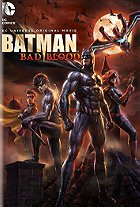 Posted : 9 years, 2 months ago on 9 March 2016 10:34
(A review of Batman: Bad Blood)
Posted : 9 years, 2 months ago on 9 March 2016 10:34
(A review of Batman: Bad Blood)Batman: Bad Blood is the third instalment in the new interconnected animated series of Batman features, following Son of Batman and Batman vs. Robin. Continuing the arc which concerns Batman's extended network of friends and family, this effort reunites veteran animation director Jay Oliva and screenwriter J.M. DeMatteis, who previously collaborated for Batman vs. Robin, and the result is every bit as middle-of-the-road as their last picture. Although Bad Blood combines enough action, humour and comic book fan service (especially with the introduction of two characters never before explored in a movie), it never quite comes together as well as it should, with so-so storytelling and pedestrian dialogue.
Batman (Jason O'Mara) has gone missing, with neither Alfred Pennyworth (James Garrett) nor Dick Grayson (Sean Maher) able to locate him. Word begins to spread throughout Gotham City that the Caped Crusader may be dead, and criminals seek to take advantage of his absence. With the weeks continuing to pass, Grayson takes up the cape and cowl, hitting the streets as Batman to maintain the illusion that the Dark Knight is still alive. Meanwhile, Damian Wayne (Stuart Allen) returns to Gotham to help search for his father, teaming up with Grayson to get to the bottom of the mystery. Also joining the fight are Batwoman (Yvonne Strahovski) and Batwing (Gaius Charles)
The issue with Bad Blood is that the story is not altogether interesting. Introducing the "Batman Family" may be a nice concept in theory, but Batman being absent for the majority of the story doesn't work here, denying us the kind of pleasures we come to expect from a Batman movie. Of course, minimising his presence is the point of this particular tale, but it's a major problem that the supporting players are not nearly as interesting as the Caped Crusader. Plus, there are fans who tune in specifically to see the titular superhero kick some butt. Ultimately, with its brisk 72-minute runtime, Bad Blood feels like it's in a hurry to establish Team Batman in order to set the scene for upcoming movies, but denies us the chance to actually care about them. Bad Blood is the first motion picture (live-action or otherwise) to feature Batwoman and Batwing, and although it's commendable that more characters from the comics are being explored, neither of them receive the meaty development that they should be allotted, especially given that film-goers who don't read comic books will not know who they are.
In keeping with the low-budget nature of these animated offerings, the visuals here are basic at best, with not much in the way of fine detail, but it still works, especially with the impressive CGI backgrounds and a number of fluid, exciting fight scenes. Although Bad Blood may be overstuffed in terms of characters (there are too many bad guys to count, too), it does deliver if taken merely as an action-packed showcase of the talents of these respective comic book heroes and villains, which is a given at this point considering the previous experience of director Jay Oliva (The Dark Knight Returns, Justice League: War). Other aspects of the movie are acceptable if not outstanding; Frederik Wiedmann's score is effective though slightly generic, while the voice acting is overly workmanlike. O'Mara is a serviceable Bruce Wayne/Batman, but he's still no Kevin Conroy.
With its banal plot, clunky storytelling, and inherent narrative shallowness, Batman: Bad Blood is a middling addition to the animated DC series. Despite a few fun action scenes, it's not essential viewing, and will probably play best only for the die-hard fans.
6.1/10
 0 comments, Reply to this entry
0 comments, Reply to this entry
Mindless fun
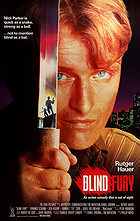 Posted : 9 years, 3 months ago on 8 March 2016 08:12
(A review of Blind Fury)
Posted : 9 years, 3 months ago on 8 March 2016 08:12
(A review of Blind Fury)For those who enjoy old-school, B-grade action movies, 1989's Blind Fury is a hidden gem that is absolutely worth checking out. The Hollywood debut for Australian director Phillip Noyce (Dead Calm, Patriot Games), this is an American appropriation of the long-running Japanese film series Zatoichi, executed with the same type of cinematic tendencies that we have come to expect from simplistic action pictures. Thus, it's excessively violent, contains a fair few action set-pieces, isn't overly interested in smarts or thematic relevance, and is backed by a cheesy electronica soundtrack. If this type of thing is your jam, have at it. But if not, there's no talking to you. It's an outright guilty pleasure, though it's one of the better movies of its kind.
Blinded during combat, Vietnam veteran Nick Parker (Rutger Hauer) is taken under the care of local villagers who nurse him back to health. In addition, they teach Parker how to use his other senses more effectively, and he perfects the art of sword fighting. Returning to America, Parker keeps his trusty blade well-hidden in his walking cane as he sets off to visit his old army friend, Frank Devereaux (Terry O'Quinn). However, his buddy is missing, and during Parker's visit, Frank's wife Lynn (Meg Foster) is killed by a group of men looking to kidnap Frank's young son Billy (Brandon Call). Choosing to protect Billy, Parker begins travelling to Reno seeking to save Frank, and every step of the way they're relentlessly pursued by henchmen working for a certain MacCready (Noble Willingham), who holds Frank captive.
Scripted by Charles Robert Carner, who also wrote the '80s martial arts actioner Gymkata, Blind Fury is brisk enough at a mere 86 minutes, and there's plenty of humour to keep the flick light and enjoyable from start to finish. The storyline is well-executed, with enough chatter and character beats to keep the enterprise coherent, while pacing is frequently agreeable, and the film certainly delivers in terms of action. To be sure, the set-pieces aren't revolutionary, but Noyce goes through the motions with sufficient panache, and there are thrills to be had. There's even a cameo by Japanese stunt performer Shô Kosugi, who also featured in a number of ninja flicks during the 1980s. Hauer trained quite extensively for his role of Nick Parker, and he's believable as a blind samurai warrior on top of being a charismatic hero. Blind Fury is certainly campy, but it's hard to resist the movie's charming mix of comedy and action.
Although it cannot be seriously defended beyond the level of guilty pleasure, Blind Fury is a good fun fight flick that will almost certainly please fans of the genre, or simply fans of Hauer. There were talks of a sequel around the time of the movie's release, but the poor box office results squashed any plans for future instalments. And that's a tremendous shame, as the movie is solid fodder for a fun action franchise not unlike the Zatoichi series, and Hauer could have done a fair bit more with this role. Blind Fury is mindless fun, nothing more and nothing less.
6.8/10
 0 comments, Reply to this entry
0 comments, Reply to this entry
Typical Eli Roth film, for better or worse
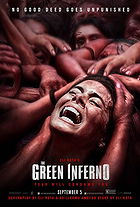 Posted : 9 years, 3 months ago on 5 March 2016 01:44
(A review of The Green Inferno)
Posted : 9 years, 3 months ago on 5 March 2016 01:44
(A review of The Green Inferno)The Green Inferno is writer/director Eli Roth's tribute to cannibal horror movies of the '70s and '80s, most notably Cannibal Holocaust and Woman from Deep River. And indeed, this type of flick is a good fit for Roth's cinematic tendencies, as he enjoys indulging in excessive gore, and his horrors are often labelled as "torture porn." Even though Roth produces countless features on a yearly basis, this is actually his first helming endeavour since 2007's limp misfire Hostel: Part II, and the filmmaker clearly hasn't learned a great deal from his mistakes. There's gore aplenty in The Green Inferno, but it lacks actual terror and chills, and it's visibly hampered by its restricted budget. The Cannibal Holocaust influence is readily apparent throughout, as Roth has basically created the closest replication possible without directly remaking the controversial classic.
The daughter of a United Nations lawyer, college student Justine (Lorenza Izzo) has a crush on handsome campus rebel Alejandro (Ariel Levy), who heads a student activist group. Spurred on by her interest in Alejandro, Justine joins the group, and reluctantly agrees to a trip to Peru to protest the bulldozing of rainforests. The protest goes off as planned, making headlines around the world, but Justine is left disillusioned, realising that Alejandro cannot be trusted and doesn't care about her safety. Making matters worse, the students are soon captured by a cannibal tribe, who intend to butcher and eat them all, one at a time.
The Green Inferno is the fourth movie that Roth has directed, and it follows the same formula, with dim-witted young people marching into unfamiliar territory where they are systematically killed off. Cabin Fever featured rural rednecks as the killers, while the Hostel films used Third World chaos to punish the naiveté of the leading characters. And now Roth turns his attention to indigenous South American tribes, though it still feels like more of the same. Considering that this is his first directorial outing in a few years, it's disheartening that Roth isn't interested in a challenge, and though he does attempt to inject some satire and commentary into the proceedings, it's text rather than subtext, and it's far less effective than the still-potent Cannibal Holocaust.
Despite impressive make-up effects by veterans Greg Nicotero and Howard Berger, The Green Inferno feels cheap to its core, with ugly digital cinematography that carries an amateurish look. This may be a $5 million horror flick, but 2015's Bone Tomahawk was produced for a fraction of that cost, and still looks far more authentic and cinematic. There's no snap or spark to elevate The Green Inferno above the ordinary, with plodding, workmanlike pacing and unconvincing performances across the board. Although Roth fills the frame with blood and guts, the result is thoroughly joyless, with no thought towards tact or style to make it palatable. To be fair, however, Manuel Riveiro's original score is effective, and there are some comedic touches that do work, including stoned cannibals who get the munchies.
It's actually somewhat miraculous that The Green Inferno ever saw the light of day. Filmed all the way back in 2012, it was set for release in 2013, but wound up being shelved for two years due to financial issues. With all that time between shooting and release, there's really no excuse for such a poor final product. The movie does admittedly boast nice locations, with filming having taken place deep in the Amazon jungle featuring real natives as extras (who had no idea what a movie was), but Roth's filmmaking is too slipshod, and the writing is hard to defend.
4.1/10
 0 comments, Reply to this entry
0 comments, Reply to this entry
A competent disaster movie
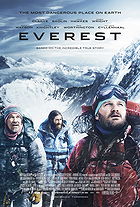 Posted : 9 years, 3 months ago on 29 February 2016 10:41
(A review of Everest)
Posted : 9 years, 3 months ago on 29 February 2016 10:41
(A review of Everest)The 1996 Mount Everest Disaster has been covered in books and documentaries, but 2015's Everest is the first major motion picture to dramatise the event. Directed by Baltasar Kormákur (2 Guns, Contraband), this is a damn good disaster movie imbued with an admirable sense of authenticity which manages to avoid outright sensationalism. For the most part, the disaster lends itself beautifully to the motion picture format, providing both tragedy and big-screen intensity, not to mention there are aspects to this tale which again prove that fact can be stranger than fiction. Indeed, this is such obvious fodder for a film that one must wonder why it took nearly two decades for one to materialise. With seasoned action filmmaker Kormákur at the helm, Everest is visually spectacular and competently executed, capturing the sheer chaos of a storm on one of the tallest mountains in the world, and conveying the arduous physical effort of mountaineering.
In 1996, several separate climbing expeditions begin ascending to the summit of Mt. Everest. New Zealand climbing enthusiast Rob Hall (Jason Clarke) runs Adventure Consultants with the aid of his base camp manager Helen (Emily Watson). Rob's new group includes journalist Jon Krakauer (Michael Kelly), experienced Texan climber Beck (Josh Brolin), and returning client Doug (John Hawkes), who refuses to give up on his dream to reach the summit. Climbing Everest is frustrating, though, with too many companies and too many clients vying for space, which threatens everybody's safety. Amid the traffic jam, Rob finds a familiar face in Scott Fischer (Jake Gyllenhaal), who owns Mountain Madness and plans to summit on the same day as Rob. But a terrible storm begins to move in on the most critical day, splitting up the climbers, leaving people stranded in the Death Zone with a low supply of oxygen.
Running at a hair under two hours, Everest does feel incomplete to an extent. The disaster is simply too vast for a single motion picture to cover, and the script cannot quite find the time to properly develop all of the individuals involved, or convey every facet of the event. (There was actually a team of IMAX filmmakers on the mountain when tragedy struck, but they are only mentioned once here, in passing.) It's important to perceive Everest as a dramatisation of the disaster, rather than an entirely accurate historical document. Some have criticised the movie for both its inaccuracies as well as the details that it excluded, yet the script hews closely enough to the many important factors of the real event, whilst only making minor changes to produce a more dramatically satisfying movie. Screenwriters William Nicholson and Simon Beaufoy also needed to fill in some of the blanks since details surrounding the deaths of some of the climbers remain unknown. Ultimately, Everest comes together well enough on its own terms, and that's what matters.
Everest is a visual blockbuster, produced with IMAX and 3D in mind, and it thankfully translates into a viewing experience that's both involving and convincing. Salvatore Totino's cinematography is eye-catching, while editing is sharp and Dario Marianelli provides a hugely effective original score. Segments of the picture were shot on the real mountain in sub-zero temperatures, and the integration of location shooting with digital effects and the staggeringly authentic sets is wholly seamless. As a matter of fact, at no point will you be consciously aware that you're looking at CGI, which is the highest honour you can award a motion picture like this. Kormákur gets plenty of mileage from the material, managing to stage nail-bitingly intense set-pieces, and even though the fates of those involved have been known for twenty years, it's easy to get involved in the movie and hope that everybody will survive regardless. Better yet, nothing comes off as excessive, with a handful of armrest-clenching beats that are more on the subtle side, and numerous nice character moments at base camp. Although Kormákur's previous motion picture efforts are entertaining, it's refreshing to see the director tackle something more challenging. He shows respect to all participants involved, even closing with authentic photos of the real people caught up in the disaster.
There are a lot of characters here, but it's easy to keep track of who's who thanks to effective characterisations, and it definitely helps that recognisable actors play the important roles. Despite the focus on visuals and set-pieces, the movie does connect on an emotional level on account of strong acting across the board, and there is a nice, palpable camaraderie between the performers. Clarke's Rob Hall is essentially the lead of the picture, though this is an ensemble effort, with all the thespians given a time to shine. The likes of Watson and Hawkes hit their marks exquisitely, while Brolin effortlessly carves out the most charismatic presence in the movie, and even Sam Worthington submits an excellent performance as rival mountaineer Guy Cotter. Also notable is Gyllenhaal, who feels severely underused and only seems to exist in the movie's peripheries. And as Hall's pregnant, worrying wife, Keira Knightley fulfils her duties well enough.
Perhaps more depth or background to the characters might have been appreciated, but Everest was designed as an immersive you-are-there experience, and it easily succeeds in this sense. It's not an easy watch, however, with Kormákur not shying away from the more unnerving aspects of this disaster, though it still stays within the confines of a PG-13 rating. Intense and affecting, this is a modern disaster movie done right.
7.9/10
 0 comments, Reply to this entry
0 comments, Reply to this entry
Just good enough
 Posted : 9 years, 4 months ago on 7 February 2016 03:48
(A review of The Visit)
Posted : 9 years, 4 months ago on 7 February 2016 03:48
(A review of The Visit)The Visit may be an imperfect thriller that never quite engages or frightens like the best genre movies, but it is a reassuring step in the right direction for director M. Night Shyamalan, whose misplaced confidence led to such indefensible disasters as The Last Airbender and After Earth. Disposing of large budgets and blockbuster thrills, Shyamalan seeks to return to his roots with The Visit, exploiting a primal fear to serve as the basis for a low-budget found footage chiller. Luckily, it works more than perhaps it had a right to, serving up scares and laughs in equal measure. It's not a genuine return to form for Shyamalan, but it nevertheless packs a punch.
Fifteen-year-old Becca (Olivia DeJonge) and her younger brother Tyler (Ed Oxenbould) have never met their grandparents, because their mother (Kathryn Hahn) had a bitter falling out with them. However, the kids are curious to meet their Nana (Deanna Dunagan) and Pop Pop (Peter McRobbie), and decide to travel to rural Pennsylvania to spend a week with them while their mother treats herself to a romantic cruise with her new beau. Becca is a budding filmmaker and seeks to use the trip as a chance to make a documentary about the pair that she hopes will mend fences. Nana and Pop Pop initially appear to be more than welcoming towards the kids, with Becca making the most of her documentary film opportunity. However, the pair soon discover that their grandparents have disturbing behavioural issues after the lights go out, and there's the lingering sense that something is not quite right.
Found footage is normally reserved for inexperienced, cash-strapped young filmmakers seeking to make their mark through limited resources, but The Visit is a different matter. Shyamalan is a seasoned director hoping to reinvigorate his creative impulses in search of a hit, keeping costs low in order to retain creative control without studio interference. Admittedly, the limitations of the found footage subgenre do prevent The Visit from being wholly satisfying, and one must wonder what the movie might have been like if it had been told through conventional means. After all, found footage cancels out the filmmaking aspects that Shyamalan actually excels at: precise framing, deliberate editing, and even the use of music. It's a more successful endeavour than, say, Renny Harlin's The Dyatlov Pass Incident, but it's nevertheless paint-by-numbers. Shyamalan adores twist endings, and The Visit sees the writer-director revisiting this characteristic to an extent, though the "twist" is not exactly mind-blowing or revolutionary, and isn't difficult to predict.
Perhaps unsurprisingly, The Visit was co-produced and distributed by Blumhouse Productions, who specialise in micro-budget horror pictures of this ilk. To Shyamalan's credit, there are a few particularly spooky sequences once the kids settle into their accommodation, including an unnerving scene set under the house. It is worth noting that the flick is not at all supernatural, with scares being derived from the mental conditions and general peculiarities of the two old people, thus the effectiveness of the horror will depend on your unease about folks of advanced age. The narrative of The Visit builds commendably, and though it's a slow-burner, the pacing is often taut. Shyamalan does a superlative job of maintaining tension during the third act, able to make us just as edgy and nervous as Becca and Tyler. But the horror is not served straight-up, with Shyamalan mixing in comical scenes and amusing dialogue, and it mostly works; the film is unexpectedly funny. However, there's an ill-advised detour into gross-out humour involving shit being shoved into somebody's face that only really serves as a visual representation of what Shyamalan has done to his audience for his past few movies.
DeJonge and Oxenbould are two of The Visit's biggest assets. DeJonge carves out a believable teenage girl character, made even more interesting by her passion for moviemaking (with a hint of pretentiousness), and she's an instantly disarming presence. Even better is Oxenbould, a comedic highlight as the goofy, shameless younger brother who's full of spirit. As opposed to dumb horror movie protagonists, these two are smart and resourceful, making it easy to care about them. Meanwhile, as Nana and Pop Pop, Dunagan and McRobbie are mightily effective, alternating between warm and disquieting.
The Visit is worth watching, but it does fall short of the narrative brilliance of the likes of The Sixth Sense or Signs. And although it does contain unnerving moments and a few surprising jump-scales, the movie is not exactly terrifying enough to truly satiate horror junkies seeking a good scare. Still, in comparison to Shyamalan's recent output, The Visit is just good enough. Let's just hope that the filmmaker's next effort will be the real comeback we've been waiting for.
6.2/10
 0 comments, Reply to this entry
0 comments, Reply to this entry
A new low for the series
 Posted : 9 years, 4 months ago on 6 February 2016 06:22
(A review of The Transporter Refueled (2015))
Posted : 9 years, 4 months ago on 6 February 2016 06:22
(A review of The Transporter Refueled (2015))The Transporter Refueled is at once wholly unrelated to the Jason Statham Transporter trilogy, and an attempt to continue the franchise as if nothing has changed. Indeed, this is a soft reboot of the Transporter series (without Statham) to whore out the brand name for all the money that it's worth, yet it isn't bold enough to try anything new, bringing back the same car, the same smart suit, the same lead character and the same type of visual style, except it's all executed on a slashed budget, and it's not even half as fun as its predecessors. (Hell, even Transporter 3 had its moments.) Suffering from a complete lack of logic and dismal acting, Refueled is a terrible new low for the series, and its technical presentation is about on the same level as a below-par straight-to-video endeavour. Trust me, it's bad.
In 1995, ruthless criminal Arkady (Radivoje Bukvic) takes over crime operations at the French Riviera, seeking to make a lot of money by exploiting women as high-price hookers. Fifteen years later, Anna (Loan Chabanol) looks to exact revenge on Arkady, teaming up with three of Arkady's former prostitutes to steal his fortune and rob his associates. Needing a driver, Anna calls upon Frank Martin (Ed Skrein) for the job, but although she initially agrees to his list of rules, she instantly changes the contract and forces Frank's involvement by kidnapping his father, Frank Sr. (Ray Stevenson).
For absolutely no good reason, The Transporter Refueled apparently takes place in 2010, with the story opening in 1995 before flashing forward fifteen years, according to an on-screen caption. But this doesn't make much sense, since the characters drive 2015 model vehicles and use iPhone 5's, leaving us to assume that either the prop department didn't get the memo, or the screenwriters were unable to handle basic math. Or nobody gave a shit. Worse, Refueled actually rips off scenes from the previous films, with Frank confronting a group of thugs in a car park who want to steal his ride, before proceeding to beat the snot out of them. And bringing in Frank's father only serves to rip off Indiana Jones and the Last Crusade, with Frank Sr. calling his son "Junior." Dialogue is mostly awful, without any degree of wit, and the flick helps itself to piles of action movie clichés. But an even more pertinent issue is that Refueled is flat-out boring. It clocks in at a rather slender 96 minutes, yet it feels twice as long, with wonky pacing and humdrum action scenes that are spoiled by jarring editing.
Refueled was directed by Camille Delamarre, who has a history with Luc Besson's EuropaCorp production company; he directed Brick Mansions and edited both Transporter 3 and Taken 2. But none of these pictures are especially good, leaving us to wonder why he was the obvious choice for this outing. Surely Besson could have recruited a proper action director? It's almost as if he's sabotaging his own movies. Even though Refueled thankfully doesn't rely so much on shaky-cam, editing is a blur, ruining the car chases and fisticuffs, with Delamarre struggling to find a proper rhythm amid all the harsh, frenetic cuts. Admittedly, things do improve to an extent in the third act, finding a few inspired moments of over-the-top lunacy, including Frank using filing cabinet draws during a brawl, and a jump from an airport tarmac into the boarding gate. The Transporter series is predicated on this type of tongue-in-cheek insanity, but there's so little of it here, and Delamarre has no clue how to properly execute coherent, enjoyable set-pieces.
Skrein may not be Jason Statham, but he certainly wants to be. An Englishman much like his predecessor, Skrein espouses his best Statham growl impersonation (but it's still pretty bad), ostensibly even trying to mimic his walk at times, but it's all for naught. Whereas Statham exudes charisma and authority, Skrein is perhaps the least intimidating action hero wannabe of recent memory. The only real saving grace in the acting department is Stevenson, with the former Punisher showing that he still has what it takes. Honestly, this should have been Stevenson's show, since he's a far more agreeable movie badass. Hilariously, Stevenson is actually only three years older than Statham, and there's a mere nineteen-year age gap between Stevenson and Skrein. The rest of the actors aren't really worth mentioning, with forgettable foreign actors speaking broken English, and with no names ever sticking.
At the end of the day, The Transporter Refueled is a pointless reboot that nobody wanted or asked for, and it's so creatively bankrupt and unengaging that you will instantly forget it before the end credits have even expired. Hell, it's possible to forget the movie whilst watching it, as my mind certainly wandered, pondering more interesting things. With the Transporter TV series seemingly over, and with this pile of crap racking up an unimpressive figure at the worldwide box office, hopefully this is the end of the franchise.
4.1/10
 0 comments, Reply to this entry
0 comments, Reply to this entry
 Login
Login
 Home
Home 183 Lists
183 Lists 1668 Reviews
1668 Reviews Collections
Collections
























